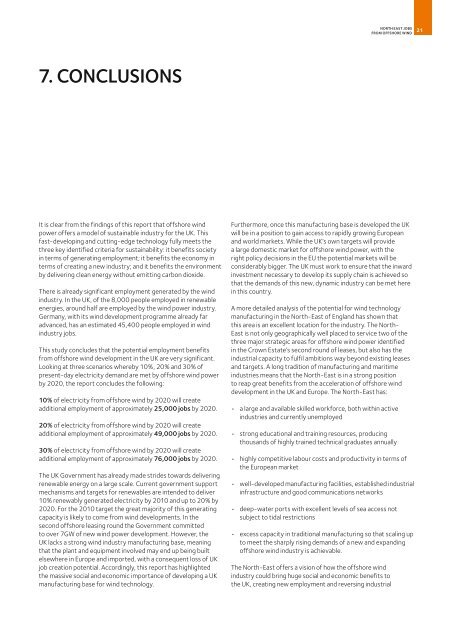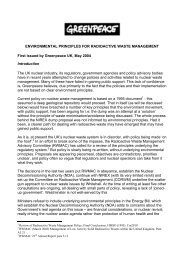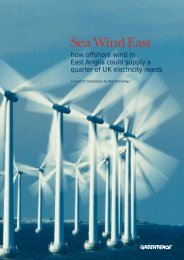offshore wind onshore jobs - a new industry for ... - Greenpeace UK
offshore wind onshore jobs - a new industry for ... - Greenpeace UK
offshore wind onshore jobs - a new industry for ... - Greenpeace UK
You also want an ePaper? Increase the reach of your titles
YUMPU automatically turns print PDFs into web optimized ePapers that Google loves.
NORTH EAST JOBS<br />
FROM OFFSHORE WIND<br />
21<br />
7. CONCLUSIONS<br />
It is clear from the findings of this report that <strong>offshore</strong> <strong>wind</strong><br />
power offers a model of sustainable <strong>industry</strong> <strong>for</strong> the <strong>UK</strong>. This<br />
fast-developing and cutting-edge technology fully meets the<br />
three key identified criteria <strong>for</strong> sustainability: it benefits society<br />
in terms of generating employment; it benefits the economy in<br />
terms of creating a <strong>new</strong> <strong>industry</strong>; and it benefits the environment<br />
by delivering clean energy without emitting carbon dioxide.<br />
There is already significant employment generated by the <strong>wind</strong><br />
<strong>industry</strong>. In the <strong>UK</strong>, of the 8,000 people employed in re<strong>new</strong>able<br />
energies, around half are employed by the <strong>wind</strong> power <strong>industry</strong>.<br />
Germany, with its <strong>wind</strong> development programme already far<br />
advanced, has an estimated 45,400 people employed in <strong>wind</strong><br />
<strong>industry</strong> <strong>jobs</strong>.<br />
This study concludes that the potential employment benefits<br />
from <strong>offshore</strong> <strong>wind</strong> development in the <strong>UK</strong> are very significant.<br />
Looking at three scenarios whereby 10%, 20% and 30% of<br />
present-day electricity demand are met by <strong>offshore</strong> <strong>wind</strong> power<br />
by 2020, the report concludes the following:<br />
10% of electricity from <strong>offshore</strong> <strong>wind</strong> by 2020 will create<br />
additional employment of approximately 25,000 <strong>jobs</strong> by 2020.<br />
20% of electricity from <strong>offshore</strong> <strong>wind</strong> by 2020 will create<br />
additional employment of approximately 49,000 <strong>jobs</strong> by 2020.<br />
30% of electricity from <strong>offshore</strong> <strong>wind</strong> by 2020 will create<br />
additional employment of approximately 76,000 <strong>jobs</strong> by 2020.<br />
The <strong>UK</strong> Government has already made strides towards delivering<br />
re<strong>new</strong>able energy on a large scale. Current government support<br />
mechanisms and targets <strong>for</strong> re<strong>new</strong>ables are intended to deliver<br />
10% re<strong>new</strong>ably generated electricity by 2010 and up to 20% by<br />
2020. For the 2010 target the great majority of this generating<br />
capacity is likely to come from <strong>wind</strong> developments. In the<br />
second <strong>offshore</strong> leasing round the Government committed<br />
to over 7GW of <strong>new</strong> <strong>wind</strong> power development. However, the<br />
<strong>UK</strong> lacks a strong <strong>wind</strong> <strong>industry</strong> manufacturing base, meaning<br />
that the plant and equipment involved may end up being built<br />
elsewhere in Europe and imported, with a consequent loss of <strong>UK</strong><br />
job creation potential. Accordingly, this report has highlighted<br />
the massive social and economic importance of developing a <strong>UK</strong><br />
manufacturing base <strong>for</strong> <strong>wind</strong> technology.<br />
Furthermore, once this manufacturing base is developed the <strong>UK</strong><br />
will be in a position to gain access to rapidly growing European<br />
and world markets. While the <strong>UK</strong>’s own targets will provide<br />
a large domestic market <strong>for</strong> <strong>offshore</strong> <strong>wind</strong> power, with the<br />
right policy decisions in the EU the potential markets will be<br />
considerably bigger. The <strong>UK</strong> must work to ensure that the inward<br />
investment necessary to develop its supply chain is achieved so<br />
that the demands of this <strong>new</strong>, dynamic <strong>industry</strong> can be met here<br />
in this country.<br />
A more detailed analysis of the potential <strong>for</strong> <strong>wind</strong> technology<br />
manufacturing in the North-East of England has shown that<br />
this area is an excellent location <strong>for</strong> the <strong>industry</strong>. The North-<br />
East is not only geographically well placed to service two of the<br />
three major strategic areas <strong>for</strong> <strong>offshore</strong> <strong>wind</strong> power identified<br />
in the Crown Estate’s second round of leases, but also has the<br />
industrial capacity to fulfil ambitions way beyond existing leases<br />
and targets. A long tradition of manufacturing and maritime<br />
industries means that the North-East is in a strong position<br />
to reap great benefits from the acceleration of <strong>offshore</strong> <strong>wind</strong><br />
development in the <strong>UK</strong> and Europe. The North-East has:<br />
• a large and available skilled work<strong>for</strong>ce, both within active<br />
industries and currently unemployed<br />
• strong educational and training resources, producing<br />
thousands of highly trained technical graduates annually<br />
• highly competitive labour costs and productivity in terms of<br />
the European market<br />
• well-developed manufacturing facilities, established industrial<br />
infrastructure and good communications networks<br />
• deep-water ports with excellent levels of sea access not<br />
subject to tidal restrictions<br />
• excess capacity in traditional manufacturing so that scaling up<br />
to meet the sharply rising demands of a <strong>new</strong> and expanding<br />
<strong>offshore</strong> <strong>wind</strong> <strong>industry</strong> is achievable.<br />
The North-East offers a vision of how the <strong>offshore</strong> <strong>wind</strong><br />
<strong>industry</strong> could bring huge social and economic benefits to<br />
the <strong>UK</strong>, creating <strong>new</strong> employment and reversing industrial




![[2007] EWHC 311 - Greenpeace UK](https://img.yumpu.com/22079793/1/184x260/2007-ewhc-311-greenpeace-uk.jpg?quality=85)











